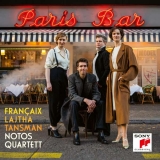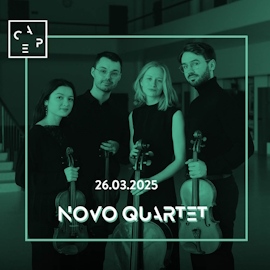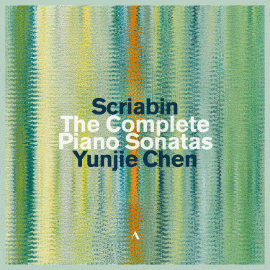‘Paris Bar’, die neue CD des Notos Quartetts aus Berlin, vereint Klavierquartette von Jean Françaix und Alexandre Tansman sowie eine Weltersteinspielung des ungarischen Komponisten Laszlo Lajtha (1892 – 1963), der in den Jahren 1911 bis 1913 für jeweils sechs Monate in Paris bei Vincent d’Indy studierte und nachhaltig von der französischen Musik beeinflusst wurde, auch wenn das 1924 entstandene Klavierquartett auch von Bachs Musik und vor allem von Lajthas traumatischen Erlebnissen in der Armee während des 1. Weltkriegs geprägt ist.
Die CD beginnt leicht und verspielt mit Jean Françaix’ Divertissement, in dem sich aber im Andante und im Mittelteil des Finales traurige Reminiszenzen an den Ersten Weltkrieg breitmachen, die die ausgelassene Stimmung des Années Folles relativieren. Dieser Mix wird in einer packenden, die Stimmungen gut differenzierenden Interpretation spannend gespielt.
Der in Lodz geborene polnisch-französische Komponist Alexandre Tansman ging 1919 nach Frankreich und nahm 1920 die französische Staatsbürgerschaft an. 1937 heiratete er die Pianistin Colette Cras, Tochter des französischen Komponisten Jean Cras. Die Zeit des 2. Weltkriegs verbrachte er im Exil in den USA, kehrte aber danach nach Paris zurück, wo er 1986 starb.
Der Komponist, der für seine neoklassischen Tendenzen bekannt ist, die er meisterhaft beherrschte, komponierte eine Musik mit reicher Ausdruckskraft und geschickten Harmonien, wie sie exemplarisch in der Suite-Divertissement zu finden ist. Und genauso exemplarisch ist die Interpretation des Notos Quartetts, das alle Stimmungen, die parodistischen wie die melancholischen, die gespenstischen wie die lyrisch-zarten oder die temperamentvollen zum Ausdruck bringt.
Doch was ist das alles gegenüber dem musikalisch so ungemein reichen Lajtha-Quartett. Im ersten Satz sind die ruhigen Passagen so beunruhigend wie eine behördliche Warnung vor einem Tsunami. Neben dem Versuch, das Böse einfach wegzustecken, äußert sich im zweiten Satz, einem Allegro, auch die Angst vor dem immer wieder aufkommenden Trauma. Das Notos Quartett lotet diese Musik tief aus, so dass sie auf den Hörer mit zwingendem Eindruck wie ein Besuch in den dunklen Lagerhäusern von Lajthas Erinnerung wirkt. Und dann lässt der wechselhafte letzte Satz einen perplex. Hier scheint alles zusammen zu kommen, Nacht und Tag, Licht und Finsternis, Vergangenheit und vor allem eine ungewisse Zukunft. Die Notos-Interpretation suggeriert einen Komponisten, der nach Ersatz sucht, um die Leere zu füllen, die er immer noch in sich spürt…
Und so ist diese CD mit dem Titel Paris Bar eine Musikbar mit Hochprozentigem, das man ohne Gefahr uneingeschränkt zu sich nehmen kann.
‘Paris Bar’, the new CD by the Berlin-based Notos Quartet, brings together piano quartets by Jean Françaix and Alexandre Tansman, as well as a world premiere recording by Hungarian composer Laszlo Lajtha (1892 – 1963), who studied in Paris with Vincent d’Indy for six months at a time between 1911 and 1913 and was profoundly influenced by French music, even though the piano quartet from 1924 is also influenced by Bach’s music and, above all, by Lajtha’s traumatic experiences in the army during World War I.
The CD begins light and playful with Jean Françaix’s Divertissement, but in the Andante and the middle section of the finale, sad reminiscences of World War I spread, putting the exuberant mood of the Années Folles into perspective. This mix is excitingly played in a gripping interpretation that differentiates the moods very well.
Born in Lodz, Polish-French composer Alexandre Tansman moved to France in 1919 and took French citizenship in 1920. In 1937 he married the pianist Colette Cras, daughter of the French composer Jean Cras. He spent the period of World War II in exile in the United States, but then returned to Paris, where he died in 1986.
The composer, known for his neoclassical tendencies, which he mastered perfectly, composed music of rich expressiveness and deft harmonies, exemplified in the Suite-Divertissement. And equally exemplary is the interpretation of the Notos Quartet, which expresses all moods, the parodic as well as the melancholic, the haunting as well as the lyrical-tender or the spirited.
But what is all this compared to Lajtha’s so immensely rich Quartet. In the first movement, the quiet passages are as troubling as an official warning of a tsunami. In the second movement, Allegro, along with the attempt to simply put away the evil, there is also the fear of the recurring trauma. The Notos Quartet plays this music deeply, leaving the listener with a compelling impression. It’s like a visit to the dark warehouses of Lajtha’s memory. And then the variable last movement leaves one perplexed. Here everything seems to come together, night and day, light and darkness, past and above all an uncertain future. The Notos interpretation suggests a composer looking for substitutes to fill the emptiness he still feels inside….
And so this CD, titled Paris Bar, is a music-bar with high-proof that can be consumed without restriction.





















